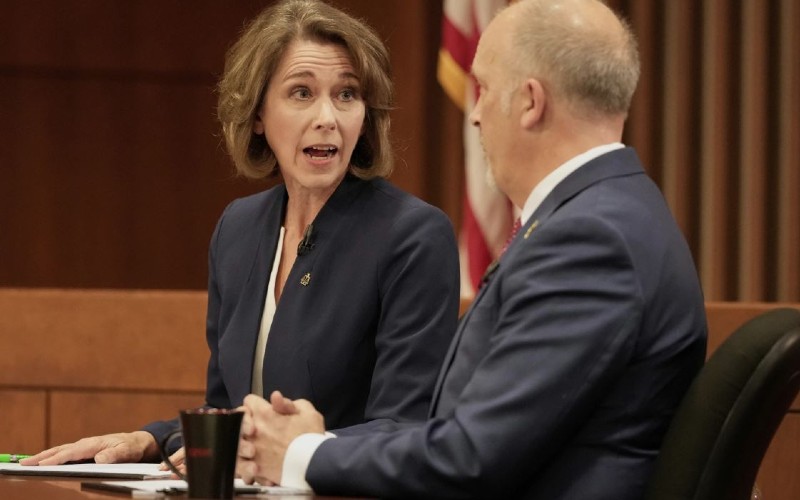Reconciliation was established in 1974 and allows for expedited consideration of certain and specified changes in law to bring both chambers together.
Budgeting through reconciliation allows Senate Republicans – who have a slim majority with 53 seats – to avoid a Democrat filibuster which requires 60 votes to overcome and proceed with business.
Lawmakers are also eyeing their coming vacation and have said they’d like to resolve differences by April 7 before a two-week Easter break.
 South Carolina Republican Lindsey Graham, chairman of the Senate Budget Committee, blasted the House bill in a meeting with reporters Tuesday.
South Carolina Republican Lindsey Graham, chairman of the Senate Budget Committee, blasted the House bill in a meeting with reporters Tuesday.
The Senate has pushed a two-bill approach to reconciliation compared to the House’s one bill, the method preferred by President Donald Trump.
“They said they needed time to do one big, beautiful bill. They had the chance, and the product is woefully inadequate,” Graham said.
One in a number of sticking points is the House bill’s absence of a measure to make permanent the expiring 2017 tax cuts.
The two sides inched closer in a White House meeting Tuesday, Politico reported.
The vibe from the Senate has been one of “slow-walking” the legislative process to back Trump’s cost-saving measures after billions in wasteful spending has been uncovered by the Department of Government Efficiency (DOGE), Rep. Warren Davidson (R-Ohio) said on Washington Watch Tuesday.
Davidson told show host Tony Perkins that Congress should take the opposite approach.
“There are a lot of us that are concerned that we shouldn't be talking about anything but staying on offense. There shouldn't be any effort to slow down the President's agenda or to slow the momentum that we're building towards saving money for the taxpayers,” he said.
Can’t we all get along?
Davidson is optimistic that leadership will speed things along.
“Senator (John) Thune (majority leader) and Speaker (Mike) Johnson are going to set a different tone than that slow-walking verbalization that’s been taking place in the Senate,” he said.
Thune and Johnson told reporters they are closer to including a debt limit increase, something the Senate has opposed.
Another hot topic is Medicaid, where the Congressional Budget Office predicts cuts are inevitable if the House Committee on Energy and Commerce is to find $880 billion in savings, a task mandated in the recent budget resolution, Politico reports.

The Trump tax cuts of 2017 face a deadline of this fiscal year for Congressional action. Some of those tax cuts related to business have already expired. If Congress doesn’t make the tax cuts permanent every individual will see a tax hike next year, Davidson said.
Tax cuts for businesses like the ability to deduct research and development costs, capital expenditures and interest payments, have already expired, Davidson said.
“That’s actively shaping our business climate today. We need to get that passed as soon as possible,” he said.
Trump’s promise of no tax on tips also requires a change in law, but that’s something that is expected to generate bipartisan support.
 Many other cuts will not, so it’s important for House and Senate Republicans agree on how to present those as part of the budget reconciliation package, Davidson said.
Many other cuts will not, so it’s important for House and Senate Republicans agree on how to present those as part of the budget reconciliation package, Davidson said.
Saving taxpayer money, once thought to be a bipartisan issue, is not that way any longer, he said.
“The government accountability office says over $100 billion in Medicaid and Medicare are going to improper payments. So why would we see people defending improper payments? Why would we let another year go by when we fail to act? We should pass something to reform this immediately,” Davidson said.
The Senate passed its first bill before the House passed its bill largely because the first Senate bill dealt more with spending than cutting, Davidson said.
Why the first Senate bill moved quickly
“It wasn’t necessarily ambitious on the savings, and it had spending attached to it. That seems to be what the Senate likes, spending,” Davidson said. “We do need to increase funding for border security, and we need to increase funding for defense in a way that’s laser-focused on America’s national security, whereas the previous administration was squandering dollars on all sorts of other things.”
While the Senate wants more time to develop its second bill, the House bill sets the stage to deal with tax reform.
“The Senate hasn’t gotten there yet,” Davidson said.
The Senate’s lack of urgency for tax reform is reflective of the chamber’s political make-up, he said.
“There are no blue-state (Republican) senators," he pointed out. "We have colleagues in the Republican conference in the House, that make our majority, that come from states like New York, New Jersey and California, where there is a sense of urgency to deal with high state and local tax issues.”







